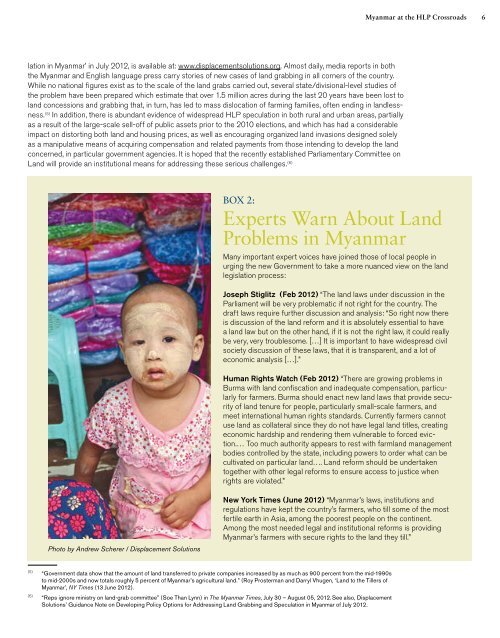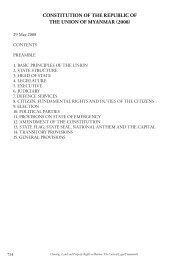Myanmar at the HLP Crossroads: - Displacement Solutions
Myanmar at the HLP Crossroads: - Displacement Solutions
Myanmar at the HLP Crossroads: - Displacement Solutions
You also want an ePaper? Increase the reach of your titles
YUMPU automatically turns print PDFs into web optimized ePapers that Google loves.
<strong>Myanmar</strong> <strong>at</strong> <strong>the</strong> <strong>HLP</strong> <strong>Crossroads</strong> 6l<strong>at</strong>ion in <strong>Myanmar</strong>’ in July 2012, is available <strong>at</strong>: www.displacementsolutions.org. Almost daily, media reports in both<strong>the</strong> <strong>Myanmar</strong> and English language press carry stories of new cases of land grabbing in all corners of <strong>the</strong> country.While no n<strong>at</strong>ional figures exist as to <strong>the</strong> scale of <strong>the</strong> land grabs carried out, several st<strong>at</strong>e/divisional-level studies of<strong>the</strong> problem have been prepared which estim<strong>at</strong>e th<strong>at</strong> over 1.5 million acres during <strong>the</strong> last 20 years have been lost toland concessions and grabbing th<strong>at</strong>, in turn, has led to mass disloc<strong>at</strong>ion of farming families, often ending in landlessness.(5) In addition, <strong>the</strong>re is abundant evidence of widespread <strong>HLP</strong> specul<strong>at</strong>ion in both rural and urban areas, partiallyas a result of <strong>the</strong> large-scale sell-off of public assets prior to <strong>the</strong> 2010 elections, and which has had a considerableimpact on distorting both land and housing prices, as well as encouraging organized land invasions designed solelyas a manipul<strong>at</strong>ive means of acquiring compens<strong>at</strong>ion and rel<strong>at</strong>ed payments from those intending to develop <strong>the</strong> landconcerned, in particular government agencies. It is hoped th<strong>at</strong> <strong>the</strong> recently established Parliamentary Committee onLand will provide an institutional means for addressing <strong>the</strong>se serious challenges. (6)BOX 2:Experts Warn About LandProblems in <strong>Myanmar</strong>Many important expert voices have joined those of local people inurging <strong>the</strong> new Government to take a more nuanced view on <strong>the</strong> landlegisl<strong>at</strong>ion process:Joseph Stiglitz (Feb 2012) “The land laws under discussion in <strong>the</strong>Parliament will be very problem<strong>at</strong>ic if not right for <strong>the</strong> country. Thedraft laws require fur<strong>the</strong>r discussion and analysis: “So right now <strong>the</strong>reis discussion of <strong>the</strong> land reform and it is absolutely essential to havea land law but on <strong>the</strong> o<strong>the</strong>r hand, if it is not <strong>the</strong> right law, it could reallybe very, very troublesome. […] It is important to have widespread civilsociety discussion of <strong>the</strong>se laws, th<strong>at</strong> it is transparent, and a lot ofeconomic analysis […].”Human Rights W<strong>at</strong>ch (Feb 2012) “There are growing problems inBurma with land confisc<strong>at</strong>ion and inadequ<strong>at</strong>e compens<strong>at</strong>ion, particularlyfor farmers. Burma should enact new land laws th<strong>at</strong> provide securityof land tenure for people, particularly small-scale farmers, andmeet intern<strong>at</strong>ional human rights standards. Currently farmers cannotuse land as coll<strong>at</strong>eral since <strong>the</strong>y do not have legal land titles, cre<strong>at</strong>ingeconomic hardship and rendering <strong>the</strong>m vulnerable to forced eviction.…Too much authority appears to rest with farmland managementbodies controlled by <strong>the</strong> st<strong>at</strong>e, including powers to order wh<strong>at</strong> can becultiv<strong>at</strong>ed on particular land…. Land reform should be undertakentoge<strong>the</strong>r with o<strong>the</strong>r legal reforms to ensure access to justice whenrights are viol<strong>at</strong>ed.”Photo by Andrew Scherer / <strong>Displacement</strong> <strong>Solutions</strong>New York Times (June 2012) “<strong>Myanmar</strong>’s laws, institutions andregul<strong>at</strong>ions have kept <strong>the</strong> country’s farmers, who till some of <strong>the</strong> mostfertile earth in Asia, among <strong>the</strong> poorest people on <strong>the</strong> continent.Among <strong>the</strong> most needed legal and institutional reforms is providing<strong>Myanmar</strong>’s farmers with secure rights to <strong>the</strong> land <strong>the</strong>y till.”(5) “Government d<strong>at</strong>a show th<strong>at</strong> <strong>the</strong> amount of land transferred to priv<strong>at</strong>e companies increased by as much as 900 percent from <strong>the</strong> mid-1990sto mid-2000s and now totals roughly 5 percent of <strong>Myanmar</strong>’s agricultural land.” (Roy Prosterman and Darryl Vhugen, ‘Land to <strong>the</strong> Tillers of<strong>Myanmar</strong>’, NY Times (13 June 2012).(6) “Reps ignore ministry on land-grab committee” (Soe Than Lynn) in The <strong>Myanmar</strong> Times, July 30 – August 05, 2012. See also, <strong>Displacement</strong><strong>Solutions</strong>’ Guidance Note on Developing Policy Options for Addressing Land Grabbing and Specul<strong>at</strong>ion in <strong>Myanmar</strong> of July 2012.













